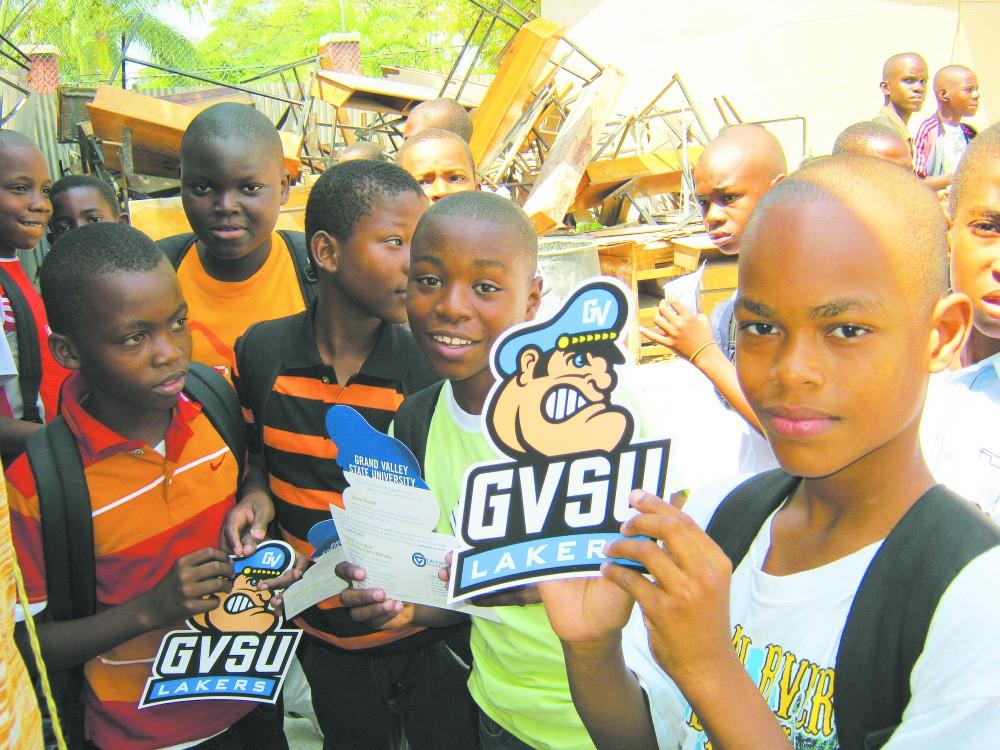GV prof, student look to reenergize Haitian student fund effort

Courtesy Photo / Peter Wampler
Mar 15, 2012
In 2010, the country of Haiti was hit with one of the worst-ever natural disasters in the Western Hemisphere, leaving its capitol Port-au-Prince in ruins. Though time has passed since the disaster, the tragedy of the destruction around them still floods the lives of Haitians each day.
However, Peter Wampler, associate professor of geology at Grand Valley State University, along with senior natural resource management major Camille McBride, is continuing efforts to help the nation he has become so invested in.
Though a little over a year ago Wampler began an the Empowering Haiti Through Education Fund, fundraising numbers still rest around 25 percent of the first goal of $30,000, which has a five-year window of achievement and would allow the fund to become permanent.
After the first goal of $30,000 is met, it would take an additional $250,000 to actually bring a Haitian student to GVSU to attend classes on the Allendale Campus — a lofty goal that Wampler and McBride both agree gets to the root of Haiti’s problem: education.
“All of the aid that was flown in and shipped in to help them, it was pretty much just a temporary fix,” McBride said. “They weren’t getting at the root of the problem and I think that this is really about education and not just about fixing a water problem. You can fix it, but when you leave they don’t know what to do.”
Wampler, alongside GVSU admissions office’s Chris Hendree and students Jared Kohler and Andrew Sission, spent time in Haiti last March talking with students and administrators there in attempt to better shape Wampler’s Haitian student fund.
“There are certainly improvements that have happened, I don’t want to say there weren’t any improvements, but I think what Camille said is true,” Wampler said. “That education is the root problem. Even if you did fix every building in Port Au Prince, it wouldn’t fix the root problem of Haiti, which is really lack of access to education and the ability to pull themselves up and fix these things. They certainly have the ability, but there’s not the opportunity.”
McBride and Wampler are currently brainstorming more ways to get students, faculty and staff at GVSU more engaged with the effort, which is currently stalled, they think, simply due to lack of awareness.
So far, they have been in talks about the creation of a student club, utilized social media outlets like Facebook to garner more manpower and raise awareness about the effort and possible partnerships with other on-campus organizations, academic departments or groups to spawn some sort of large-scale fundraising effort.
“One of the things I would love to have happen is to get a lot of students excited about the effort,” Wampler said. “Because right now, there hasn’t been a lot of connection with students. If we can get students behind it, we can at least raise awareness. Even though they may not have money to give, they can at least increase excitement and awareness.”
Though she said at the time of the earthquake, the constant media attention was enough to keep Haiti in her thoughts, McBride herself said prior to a classroom visit from Wampler to talk about Haiti, their on-going struggle was sort of “out of sight, out of mind.”
“When (Wampler) came to talk to our class, I was shocked to find out that there hasn’t been much improvement,” she said. “They don’t have the infrastructure to rebuild buildings, the kids are learning in tents and it’s an awful situation. So I think awareness is key, because it’s not that people don’t want to help, it’s that they don’t know about it.”
Wampler said, realistically, he hopes to be commemorating the Jan. 10, 2014, anniversary of the Haitian earthquake by clearing the first $30,000 hurdle and getting one step closer to bringing a student to GVSU’s campus.
“Then at least you’ve proved that it’s a viable cause and you can go to other people and say, ‘OK, we’ve got this, but can you help us get to the next step,’” Wampler said. “If we can get a critical mass, then we can do something.”
If an individual or group is interesting in helping the Empowering Haiti Through Education Fund, contact Wampler by email at [email protected] or at his office,616-331-2834.
For more information, check out the fund’s website at www.gvsu.edu/haiti.





















